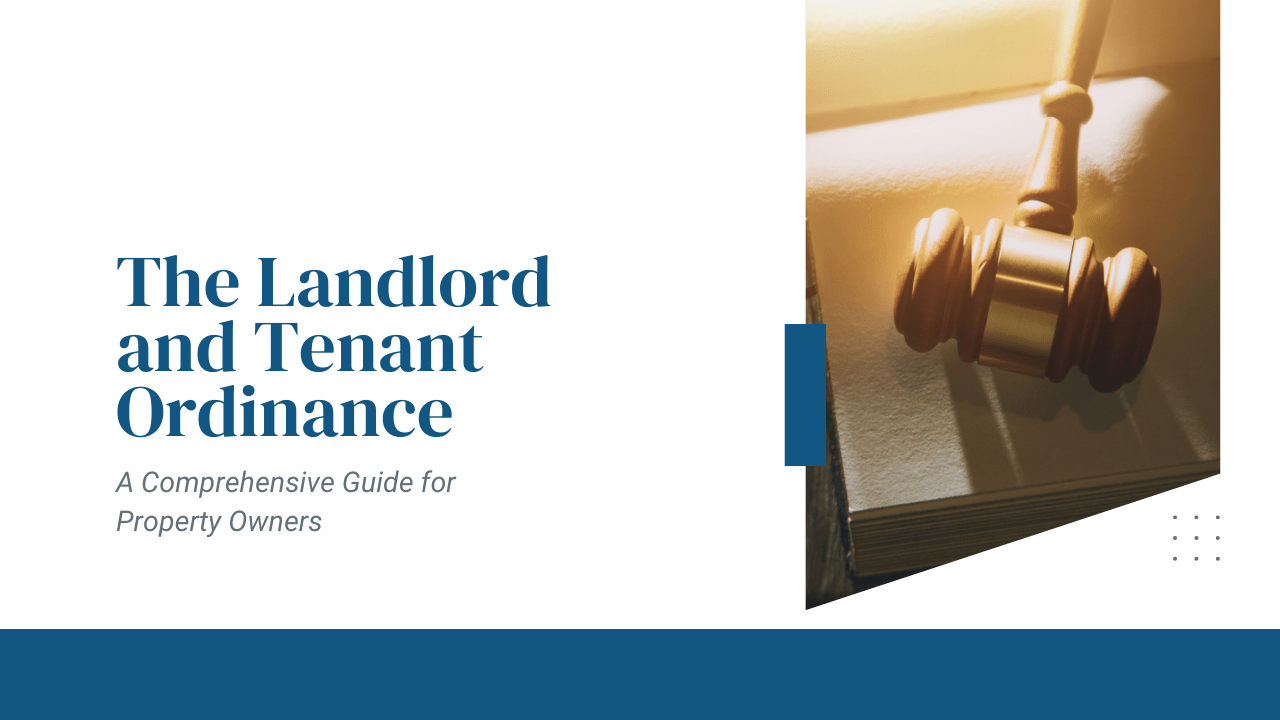How worried are you about making a legal mistake with your rental property?
Most landlords do worry that they’re missing something. There are so many state, federal, and local laws to follow as an investor or landlord.
This is part of navigating the world of rental property management in Chicago, and it can be complex. Things get especially challenging when it comes to understanding and complying with local regulations. If you’re investing in Chicago properties from outside of the area, you may not even know what these laws are. This is one of the reasons that local Chicago property management is so important.
Let’s talk about one local law in particular. It’s probably the most important local law to every landlord and tenant in Chicago.
What do we mean? We’re talking about the Chicago Landlord and Tenant Ordinance (RLTO), which is a key piece of legislation that every real estate investor and landlord should be familiar with to ensure smooth operations and to avoid legal pitfalls.
We have a lot of experience working with this law and helping our owner stay compliant with it. So, we have put together this comprehensive guide, which we hope will answer a lot of the questions you may have around this law. Come with us as we break down the essentials of the Chicago Landlord and Tenant Ordinance, highlighting the most crucial aspects property owners need to know.
Understanding the Chicago Landlord Tenant Ordinance
The Chicago Landlord and Tenant Ordinance was enacted to protect the rights of both landlords and tenants in rental agreements. It outlines the responsibilities and obligations each party has, covering everything from lease agreements to security deposits. This is an important starting point if you’re new to renting out property in Chicago, and it’s also important that experienced landlords and property owners review the law from time to time and check for updates and changes.
Key Provisions of the RLTO
Lease Agreements
Under the RLTO, lease agreements must be in writing if the lease term is one year or longer. The ordinance also requires landlords to provide tenants with a copy of the Chicago Residential Landlord and Tenant Ordinance Summary (CRLTO Summary), ensuring tenants are aware of their rights and responsibilities. Make sure this is part of your process as you’re approving tenants, signing lease agreements, and preparing for your tenants to move in. A lease agreement is always necessary; we’d never recommend that you let a tenant move into your property without one. And while this law requires a lease, you want to make sure you do more than have a document ready to sign. You want to make sure your lease agreement includes all of the pertinent information. This will be your starting point if there’s a question during the tenancy or a conflict. You will refer to the lease agreement first if there’s a disagreement over rent, maintenance, or something else.
Security Deposits
There are state laws that govern security deposits, but there are also local requirements that come first for landlords and investors in Chicago. The RLTO mandates that landlords hold security deposits in federally insured interest-bearing accounts. This is an important detail that you don’t want to overlook; make sure you’re choosing the right bank account when you collect and deposit this money. Landlords are also required to pay interest on the security deposit to the tenant annually. You’ll want to make sure your accounting is set up to accommodate this. Finally, this law requires that security deposits be returned to your departing tenants within 45 days after the lease ends, along with an itemized statement of any deductions. Make sure you carefully document any of the deductions you’re making.
Repairs and Maintenance
The ordinance obligates landlords to maintain the rental property in a habitable condition, including compliance with all applicable health and safety codes. Tenants have the right to request necessary repairs, and if not addressed promptly, may be allowed to make repairs and deduct the cost from their rent, after providing proper notice. You don’t want to find yourself in the situation where your tenants are making their own repairs. The work will potentially not be up to your standards, and you’ll be losing the rent that they now don’t have to pay because you were too slow in responding to their maintenance request. Have a repair process in place that protects you from this possibility.
Late Fees and Rent Increases
The RLTO limits late fees to $10 per month for rents of $500 or less, and 5% of the monthly rent for rents over $500. Rent increases require a 30-day written notice for month-to-month leases or upon expiration of the lease term, with reasonable grounds for the increase. Your lease agreement should reflect these details as well.
Evictions
Evictions are strictly regulated under the RLTO. Landlords must follow specific procedures, including providing notice to tenants and obtaining a court order to regain possession of the property. Self-help evictions, such as changing locks or removing tenant belongings, are illegal.
Compliance and Best Practices for Chicago Landlords
For real estate investors and landlords, complying with the Chicago Landlord Tenant Ordinance is an important part of just about following the law. It’s important to comply and to protect yourself from claims, disputes, and legal actions. Mistakes are easy to make. Some of the best practices around compliance include:
Stay Informed
Regularly review updates to the RLTO to ensure your leasing, rental, and maintenance practices and lease agreements align with current regulations. Consider joining local landlord associations or attending workshops to stay informed.
Effective Communication
Maintain open lines of communication with tenants. Address concerns promptly and keep documentation of all interactions and agreements. If there’s a dispute over maintenance or security deposits, do your best to resolve the issue before it escalates.
Detailed Record-Keeping
Keep accurate records of all transactions, including rent payments, repair requests, and communications with tenants. This documentation can protect you in case of disputes.
Penalties for Ordinance Violations
Violating the Chicago Landlord Tenant Ordinance (RLTO) can lead to significant penalties for landlords, undermining your ability to manage properties effectively and earn any money on your rental home. The consequences of such violations may include monetary fines, forced compliance measures, and potential loss of rental income. Here’s what you need to be aware of in terms of penalties and consequences:
Monetary Fines
Landlords found in violation of the RLTO may be subject to fines imposed by the city. These fines can vary depending on the nature and severity of the infraction, potentially amounting to hundreds or even thousands of dollars.
Court Orders and Compliance
If a tenant files a lawsuit due to a landlord's violation of the RLTO, the court may issue an order requiring the landlord to comply with the ordinance. This could include mandates for repairs, the return of security deposits plus punitive damages, or adherence to proper eviction procedures.
Loss of Rental Income
Landlords who engage in illegal eviction practices may face significant financial repercussions, including lost rental income during litigation and potential claims for damages by affected tenants. When tenants know their rights and are aware of violations, they are more likely to pursue legal action, which can escalate costs for landlords.
Damage to Your Reputation as a Landlord
Beyond legal and financial penalties, violations of the RLTO can harm a landlord’s reputation within the community. Negative reviews and complaints from disgruntled tenants will take on new credibility when you’re found to be violating local rental laws.
By understanding these penalties, landlords can better appreciate the importance of compliance with the RLTO and work proactively to avoid violations.
Importance of Professional Property Management in Chicago
 Consider hiring a professional Chicago property management company to handle day-to-day operations, ensuring compliance with all local laws and ordinances. As you can see, this law is detailed and complex, and it’s only one law. There are also fair housing laws to contend with. You need to know who the protected classes are and how to avoid discriminating against them. You need to know the difference between a service animal and an emotional support animal.
Consider hiring a professional Chicago property management company to handle day-to-day operations, ensuring compliance with all local laws and ordinances. As you can see, this law is detailed and complex, and it’s only one law. There are also fair housing laws to contend with. You need to know who the protected classes are and how to avoid discriminating against them. You need to know the difference between a service animal and an emotional support animal.
Working with a property manager is more necessary than ever. There is a lot of risk involved in renting out a property, and you don’t want to invite that kind of liability into your rental process. When you have the help of an experienced professional, you can be sure you aren’t violating any laws, and you’ll enjoy the peace of mind that comes with having experts take care of your rental operations.
Understanding and adhering to the Chicago Landlord and Tenant Ordinance is critical for property owners looking to succeed in the competitive Chicago rental market. Let us help you create a positive experience for both you and your tenants. It starts with knowledge and compliance.
If you have questions or need further assistance with the RLTO, please contact us at Paragon Property Management Group.



